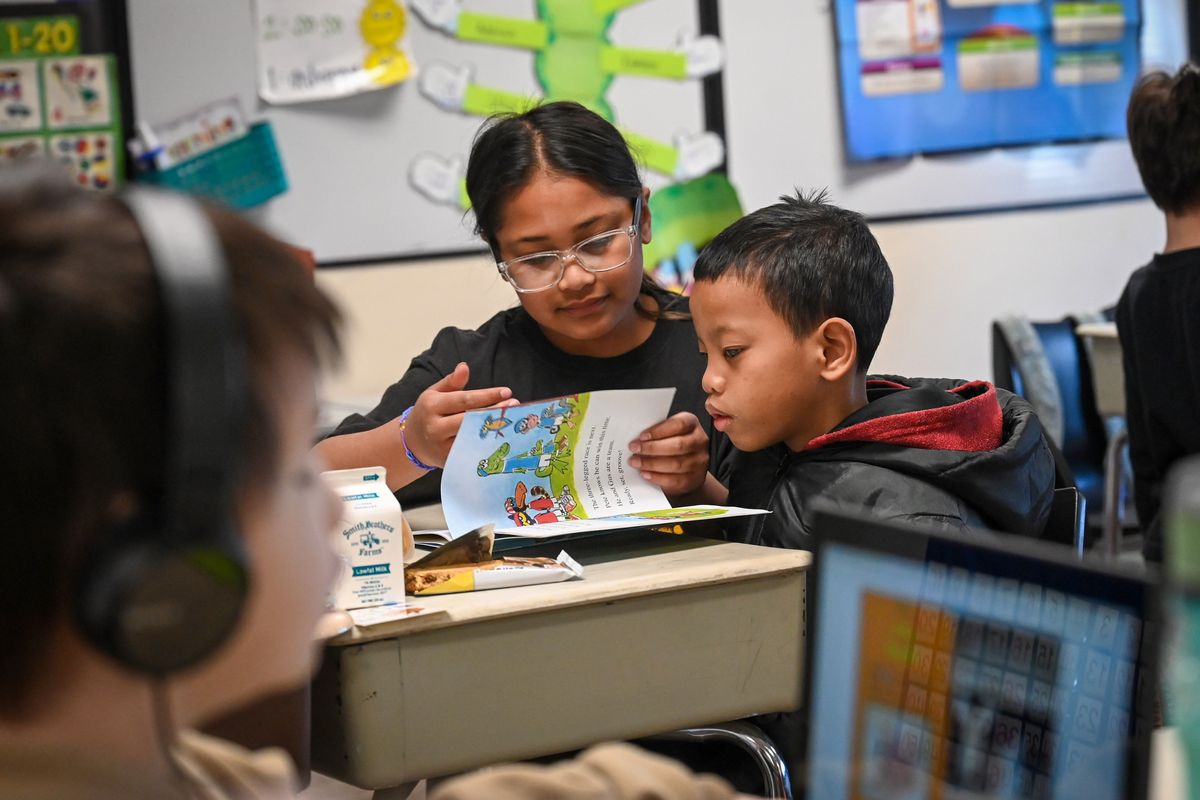Educator club gives kids interested in education a chance to try out profession

Teachers and staff at Frances Scott Elementary in Spokane’s East Central Neighborhood are committed to recruiting the next generation of teachers to lead their students, creating an Education Club that allows students to do everything from lesson planning to teaching.
Principal Larry Quisano said his goal was to reach out to kids who were interested in education, but might not have thought about becoming teachers as adults. Last fall he visited each fifth- and sixth-grade class to ask if anyone had thought about becoming a teacher.
“That started the conversation,” he said.
Teacher shortages have become more common and recruiting future teachers in elementary school might help solve that problem as well as provide career opportunities for students.
“This was all about giving our kids different opportunities for success,” he said. “Teaching is such a rewarding experience, but it is difficult sometimes.”
Quisano recruited four teachers to mentor the 20 students who submitted an application to join the club. The student body at Frances Scott is 70% children of color, Quisano said, and he’s pleased that the Education Club members reflect that diversity.
“That’s an exciting prospect,” he said. “Not only are we exposing kids to teaching, we’re exposing kids of color to teaching.”
Club students started out silently observing classrooms in the younger grades for 30 minutes once a week. During the biweekly club meetings after school they learned about classroom management, teaching standards and lesson planning. Then they started serving as teaching assistants and working with younger students in the classrooms where they had been observing.
Sixth-grader Kituza Bigera had thought about becoming a teacher before and she’s excited about everything she’s been learning in Education Club.
“I thought it would be a good opportunity to learn what teachers do,” she said. “We’ve been able to go to different classes so far. I get to help second graders.”
Sixth-grader Brandon Hawkes has helped in a first grade classroom.
“It can be hard for some kids,” he said. “I’ve been helping them with counting to 120 and I do flash cards with words. My favorite part is just learning with the kids and seeing how they learn.”
The experience has helped fifth-grader Karli McIntyre realize that she enjoys working with older students better.
“Second grade and below I can’t handle,” she said.
McIntyre said she enjoys helping students one-on-one. She’s glad she decided to join the club. “It just sounded like fun,” she said. “I’ve always had a dream of becoming any kind of teacher. It’s something I’ve wanted to do since I was little.”
Fifth-grader Keaila Moreng said she’s also thought about being a teacher for a long time. “Learning to be a teacher is fun,” she said.
She’s been helping a first-grade classroom and said she likes working with kids that age. “They’re just cute and sometimes annoying and that’s what I like,” she said.
Science specialist Ian McKinley, one of the four teacher mentors, said he wants the students to have fun and learn so they can be more confident in the future. He said it wasn’t difficult to teach them the things they would need to know.
“They were actually really quick to pick up on standards and lesson planning,” he said. “They thought about how they would like to learn as first-graders. Hopefully, they can communicate with these younger brains better than we can.”
After spring break, Education Club students returned with a new task – use their newfound knowledge to teach a lesson in class.
Quisano said he knows he won’t see results from the Education Club for more than a decade, the time it will take these students to graduate from high school and then go on to college to get a teaching degree. But he’s hopeful that the seeds they are planting will take root and bear fruit.
“They’ve talked about coming back and teaching here,” he said. “We have to be committed to this. It’s a long time to wait for the seed to grow.”